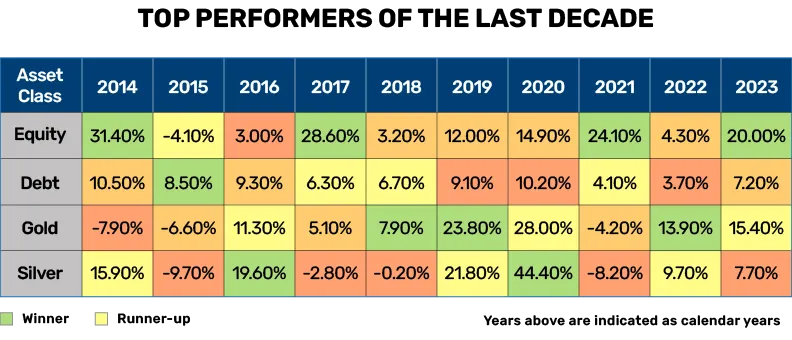List of Equity Mutual Funds Schemes
Bajaj Finserv Small Cap Fund
Equity Fund Regular GrowthBajaj Finserv Multi Cap Fund
Equity Fund Regular GrowthBajaj Finserv ELSS Tax Saver Fund
Equity Fund Regular GrowthBajaj Finserv HealthCare Fund
Equity Fund Regular GrowthBajaj Finserv Consumption Fund
Equity Fund Regular GrowthBajaj Finserv Large Cap Fund
Equity Fund Regular GrowthBajaj Finserv Large and Mid Cap Fund
Equity Fund Regular GrowthBajaj Finserv Flexi Cap Fund
Equity Fund Regular GrowthWhat are equity mutual funds?
Equity mutual funds are investment vehicles that primarily allocate capital to stocks or equities. These funds offer investors the potential for substantial capital appreciation over the long term by investing in shares of publicly traded companies. Equity mutual funds come in various forms, including actively managed funds, sector-specific funds, and more. They cater to investors seeking growth opportunities who are willing to accept higher volatility in exchange for potentially higher returns.
How do equity funds work?
Equity funds pool money from multiple investors and invest in a diversified portfolio of stocks. There are various types of equity funds such as mid cap fund, large cap fund, flexi cap fund, etc. The fund manager selects stocks based on various factors such as company fundamentals, industry outlook, and market trends. The goal is to achieve capital growth by investing in companies with strong growth potential or undervalued stocks that have the potential to appreciate over time.
Unlike debt funds, where returns are primarily generated through interest income, equity funds derive their returns from capital gains – the difference between the purchase price and the selling price of the stocks held in the portfolio. These funds may also distribute Income Distribution cum Capital Withdrawal (IDCW) to investors, which could be a portion of the profits earned by the underlying companies.
Who should invest in equity mutual funds?
Equity funds are suitable for investors with a longer investment horizon and a higher risk tolerance. They can be suitable for individuals seeking to build wealth over time, such as young professionals, retirement savers, and those with long-term financial goals. While equity mutual funds offer the potential for higher returns compared to debt funds, they also come with higher volatility and a higher risk of capital loss.
Investors looking to diversify their investment portfolio and make use of the growth potential of the stock market may consider allocating a portion of their assets to equity funds. However, it's essential to align investment decisions with personal financial goals, risk tolerance, and time horizon. This is because different equity funds may have different investment objectives. For instance, large-cap funds are well-suited for conservative investors seeking stable long-term returns, whereas mid-cap funds are more appropriate for moderately risk-tolerant investors pursuing long-term growth, albeit with slightly higher risk.
What are the types of equity mutual funds?
SEBI categorizes equity mutual funds In India into several segments:
-
Large cap funds: Invests in the top 100 companies by market capitalisation, known for their stability and lower risk. These funds allocate at least 80% of assets to large cap companies.
-
Mid cap funds: Focuses on companies ranked from 101st to 250th by market capitalisation. They target younger companies with higher growth potential, allocating at least 65% of assets to mid-cap stocks.
-
Small cap funds: Invests in companies ranked beyond the top 250 by market capitalisation, known for their higher risk and potential for substantial growth. These funds allocate a minimum of 65% of assets to small cap companies.
-
Large and mid cap funds: These funds invest in both large and mid-sized companies, balancing stability with growth potential. They allocate at least 35% of assets to both large and mid-cap stocks.
-
Flexi cap funds: Offers flexibility by investing across companies of all sizes based on market conditions. They invest a minimum of 65% in equity and equity-related instruments.
-
Multi cap funds: Invests across large-cap, mid-cap, and small-cap stocks, providing a blend of stability, growth potential, and flexibility. These funds must invest at least 75% of assets in equity and equity-related instruments. Also, a minimum of 25% should be invested in equity instruments of large-cap, mid-cap and small-cap each.
Features and benefits of equity mutual funds
Equity funds offer a range of benefits that make them a suitable option for investors seeking growth opportunities while managing risk. Here are some key advantages:
-
Professional management: Managed by skilled fund managers who make investment decisions.
-
Diversification: Spreads investments across multiple stocks to reduce risk.
-
Liquidity: Units can be sold daily at the current NAV, ensuring easy access to funds.
-
Growth potential: Aims for long-term capital appreciation through equity investments.
-
Expertise access: With equity funds, you can benefit from fund managers' stock analysis and informed decisions.
-
Affordability: Access diversified portfolios with a modest initial investment.
Taxation rules of equity mutual funds
Understanding the tax implications of equity funds can help you plan and optimize your investments effectively. Here are the taxation details for different types of equity mutual funds:
Income Distribution cum Capital Withdrawal (IDCW): IDCW includes dividends and capital gains distributed by mutual fund schemes. Dividends are added to the investor’s taxable income and taxed as per their income tax slab rate. Dividends exceeding Rs. 5,000 are subject to a standard TDS rate of 10%.
Capital Gains Tax: When selling mutual fund units at a profit:
-
As per the 2024 Union Budget, short-term capital gains (held for less than 12 months) from equity funds are taxed at 20%, plus surcharge and cess.
-
As of the 2024 Budget, long-term capital gains (held for 12 months or more) up to Rs. 1.25 lakh per year are tax-free. Gains exceeding this limit are taxed at 12.5%, plus surcharge and cess.
How to choose a suitable equity mutual fund?
To choose an equity mutual fund scheme that may be suitable for you, consider factors such as your financial goals, risk tolerance, and investment horizon. Since equity funds invest in shares of companies, they may offer the potential for long-term wealth creation but also carry higher market-related risks compared to debt-oriented funds. Reviewing aspects like the fund category, performance trends*, and expense ratio may help in making an informed decision. It is also advisable to review scheme-related documents and, if needed, consult a financial advisor to assess whether the scheme is suitable for your profile.
*Past performance may or may not be sustained in future.
Things to consider while investing in equity mutual funds
Before investing in an equity fund, investors should conduct thorough research and consider the following factors:
-
Investment objective: Determine whether the fund's investment objective aligns with your financial goals, whether it's capital appreciation, IDCW income, or a combination of both.
-
Risk profile: Assess your risk tolerance and investment horizon to choose an equity fund that matches your risk-return preferences.
-
Fund performance: Evaluate the historical performance of the fund, considering both short-term and long-term returns relative to its benchmark and peer group.
-
Fund manager expertise: Research the track record and experience of the fund manager in managing equity portfolios and their investment strategy.
-
Diversification: Consider the diversification benefits offered by the fund's portfolio across different sectors, industries, and market capitalizations.
How to invest in equity funds?
You can invest in equity mutual funds either through a Systematic Investment Plan (SIP), which allows disciplined investing in smaller amounts at regular intervals, or through a lumpsum contribution. Many investors find SIPs suitable as they help spread your investments over time, which makes investing more affordable and removes the need to time the market.
You can start an SIP or lumpsum either online or offline, directly through fund houses or through a mutual fund distributor after completing the necessary Know Your Customer (KYC) requirements. It is important to review your chosen scheme, understand the risks involved, and align the investment with your financial goals and investment horizon before proceeding.
Learn About Mutual Funds

Investing isn’t just about numbers,…

In today’s fast-paced consumerist…

When markets fluctuate significantly…

Building long-term potential wealth…

Retail participation in India’s…

Of the almost 4 crore unique…

Traditional wisdom in the mutual…

Retail investors predominantly…

A common question among investors is…

Equity, debt, gold, and silver have…

Recently, at a bustling farmers’…

Walk into your closet and take a…

You may not realise it, but when you…

Over the years, mutual funds have…

Planning for retirement involves…

Securing a comfortable post-…
Frequently Asked Questions (FAQs)
Equity mutual funds primarily invests in stocks or equities. These funds aim to achieve capital appreciation by investing in companies with growth potential or undervalued stocks.
Yes, equity funds carry a higher level of risk compared to debt funds due to the volatility of the stock market. They are subject to market fluctuations, economic conditions, and company-specific risks.
When selecting an equity fund, consider your investment goals, risk tolerance, and time horizon. Look for funds with a consistent track record of performance, experienced fund managers, and a well-diversified portfolio aligned with your investment objectives. Conduct thorough research and seek professional advice if needed.
You can invest in equity mutual funds in India through SIP as well as lumpsum. SIP options can start as low as Rs. 500.
Equity mutual funds typically have a recommended investment horizon of at least 5 years or more. This longer timeframe helps to ride out market fluctuations and capture potential growth in stock prices.
Investing in equity funds in India can be beneficial for those seeking higher returns compared to traditional savings options like bank deposits. However, it involves market risks, so it's important for investors to have a long-term investment horizon and be prepared for fluctuations in value.
Equity refers to ownership in a company, typically through stocks, allowing direct exposure to stock market risks and returns. Mutual funds pool money from investors to invest in a diversified portfolio of stocks, bonds, or other assets, offering managed, lower-risk exposure than individual equity investments.
Equity mutual fund returns are subject to market risk and can fluctuate significantly from time to time. You can look at the past returns over three years, five years and longer intervals to get an idea of how much a scheme can potentially offer over multiple different market cycles. However, past performance may or may not be sustained in the future.
Equity funds tend to be volatile, especially in the short-term, and thus they may not be suitable for conservative investors and those with a low risk appetite. Such investors may consider debt mutual funds that offer relative stability and the potential for reasonable returns.
Neither is inherently better. Mutual funds offer diversification and professional management, which can mitigate risk and make investing accessible to beginners and those who do not have the expertise or time to track the markets. Direct equity carries higher risk but more control. It may be suitable for those who are familiar with the ins and outs of trading/investing and can control and manage their portfolios independently.
Yes, open-ended equity funds are generally liquid and you can redeem units when needed, but the value at redemption will depend on the prevailing Net Asset Value, which in turn depends on market conditions. Moreover, equity mutual funds are suitable for long-term investing, so it is advisable not to withdraw on impulse, as this may take you away from your goals. Lastly, capital gains on equity funds are taxable, so it is important to familiarise yourself with tax laws.
Cut-off time in mutual funds is the SEBI-specified time by which your purchase or redemption request must reach the fund house (subject to realization and availability of the funds in the bank account of mutual fund) to determine which day’s NAV will apply.
You may use online SIP calculators to estimate potential returns on your investment based on your investment amount, tenure and expected returns. However, the calculator’s estimates are for illustrative purposes only and actual returns will depend on market conditions – they are not fixed or guaranteed.
There is no fixed or universally suitable time to invest in an equity fund; the decision depends on your financial goals and investment horizon. Generally, the earlier you start, the more time your money gets to potentially grow through the power of compounding.
Mutual Fund Videos: Watch, Learn, Invest

Megatrends investing means looking…
Megatrends help anticipate the…
Megatrends investing focuses on long…


